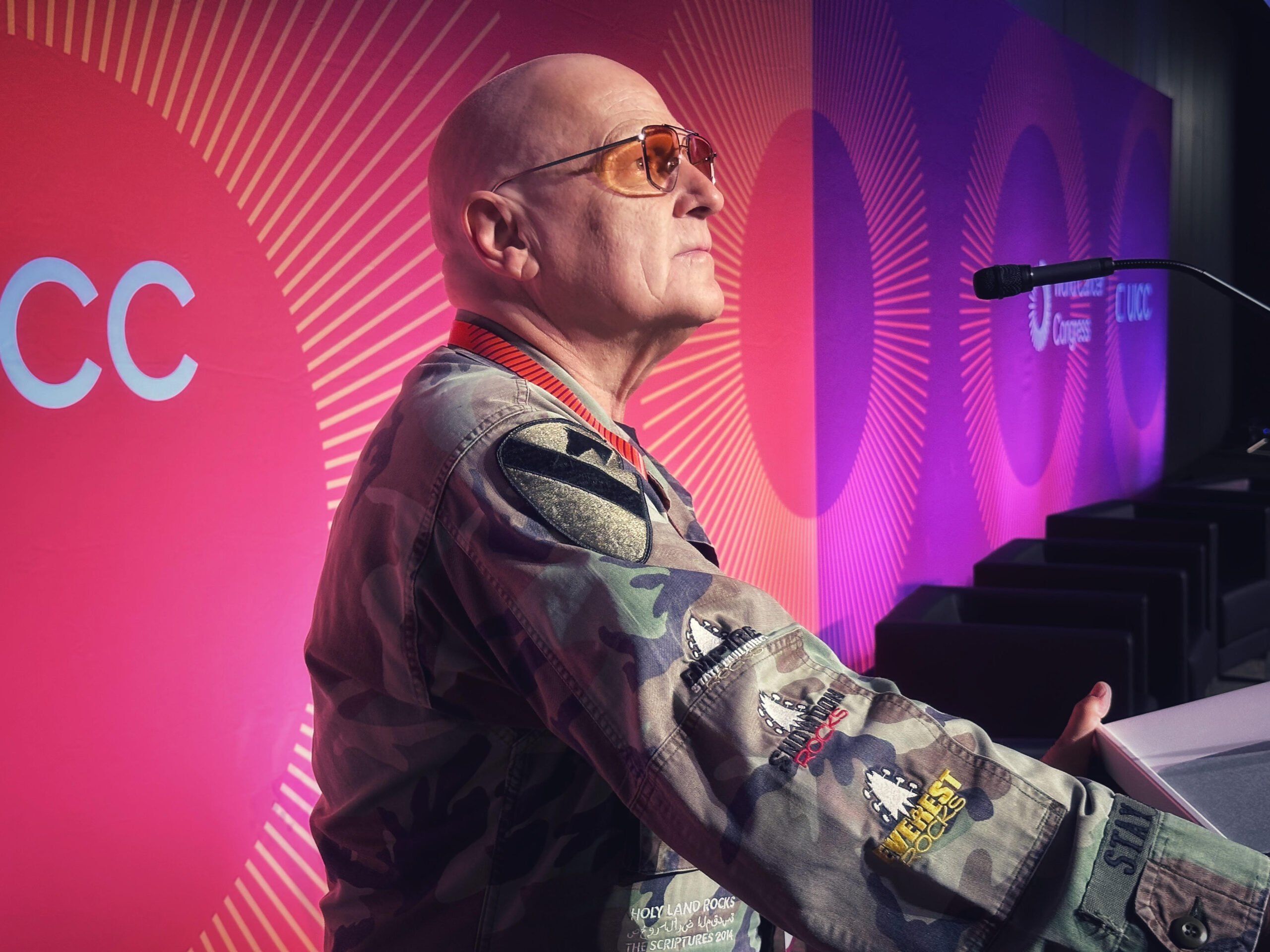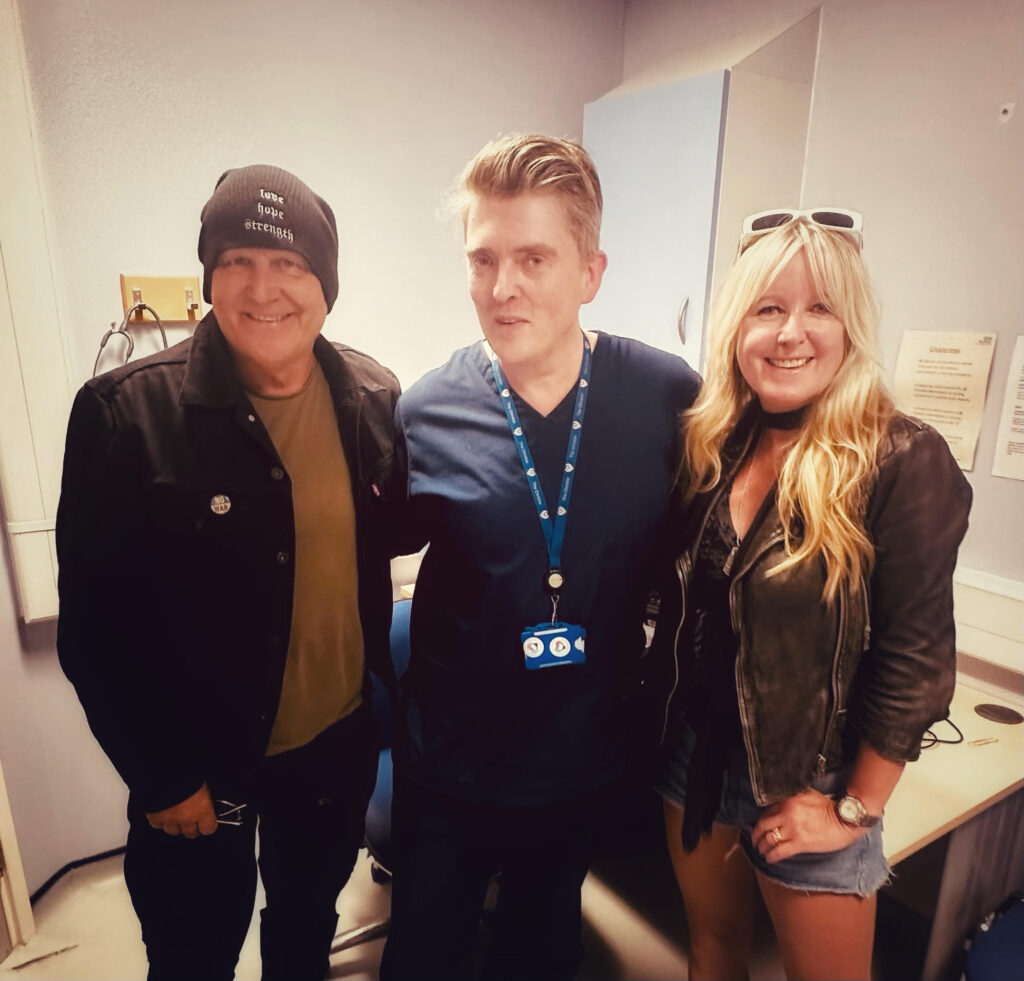One in a Million. The Love Hope Strength Campaign
“I may be living with a rare and aggressive lymphoma, and need a stem cell transplant, but I know I’m lucky. I have my beautiful family, I live in an incredible part of the world, I have my music and all that comes with it.

I’m also exceptionally lucky because I’m able to access the very best medical treatment and care, and because it looks highly likely that a matching stem cell donor will be found for me. Only 30% of people will have a matching stem cell donor within their own family, which
means the vast majority of people will need an unrelated stem cell donor.
A complete stranger will likely provide a potentially life saving stem cell donation for me. My donor will be my one in a million, my chance of survival.
Currently, only 60% of patients will find a matching stem cell donor, making the need for new donors critical. Could you register to become a potential blood stem cell donor, and be someone’s one in a million?
My wife Jules and I have got to know others who like me need that second chance of life, and we want to do more. Through the charity we established together almost two decades ago, Love Hope Strength, we are launching the One in a Million campaign in partnership with
DKMS to register more people to become blood stem cell donors.
Think about your one in a million. Your partner, your child, parent, or your best friend. Imagine if they need a stem cell donation.
It’s easy to get registered to be a potential stem cell donor. You can order a swab kit online, and it takes less than 10 minutes.
Do something great today. Rally everyone you know to get on the list to potentially save a life now.”
Mike Peters, Honorary President, Love Hope Strength Foundation
12th November 2024
Be someone’s one in a million.
Register now in the UK.
Register now in the USA.
One in a Million. The Love Hope Strength Campaign
[November 2024 – November 2026]
The Love Hope Strength Foundations were established in 2006 following the development of a friendship between the co-founders, James who had undergone a life-saving bone marrow transplant after being diagnosed with cancer, and Mike and Jules who were adapting to living with Mike’s own leukaemia diagnosis. Love Hope Strength has supported people with cancer across the globe in different ways over the past two decades, and over 250,000 people have been registered as potential stem cell donors through Love Hope Strength’s ‘Get on the List’ campaign in partnership with international blood cancer non-profit, DKMS.
Mike has lived with Chronic Lymphocytic Leukaemia (CLL) for years. The CCL has now transformed into a rare and aggressive lymphoma known as Richter’s Syndrome. He now needs a stem cell transplant, just as James did two decades ago. A total stranger will be Mike’s one in a million.
Here at Love Hope Strength, we’re determined to do more to help people diagnosed with a blood cancer. That’s why we are launching a two-year campaign, ‘One in a Million’. Over the next two years, we aim to double the number of people Love Hope Strength has helped to register as potential stem cell donors, to bring it to half a million people.
Be part of ‘One in a Million’, it’s as easy as 1, 2, 3.
- Find out if you’re eligible to register to donate your blood stem cells and sign up to
receive a swab kit online:
Register now in the UK.
Register now in the USA. - Download this information and send it on to your family and friends so they can receive a swab kit online and get registered.
- Host a donor drive in your local area in the USA or the UK, at work, at a community event or throw your own party to encourage your neighbours and colleagues to register as potential stem cell donors. Contact the Love Hope Strength crew at hello@lovehopestrength.org for more information, or fill in the form at the bottom of this page.
What are the challenges that ‘One in a Million’ aims to tackle?
- Accessibility. Only 30% of people will have a matching stem cell donor within their own family, which means the vast majority of people will need an unrelated stem cell donor.
- Support. Research suggests that one in three people with cancer experience mental or emotional distress, and three in five people who have or have had cancer feel the mental challenge of cancer is harder to cope with than the physical treatment and side effects.
- Inequity. It is already very hard for patients to find a matching donor, and for a patient of colour it is even more difficult due to the lack of diversity on the registry. In the UK, only 5% of the entire UK National Aligned Stem Cell Registry are from minority ethnic backgrounds, which disproportionately affects people from those same backgrounds due to matching being heavily correlated to ethnic background. In the US, ethnic minorities are also underrepresented in the donor pool.
What do we aim to achieve through ‘One in a Million’?
- Increase the number of possible life-saving matches available for people with a blood cancer or blood disorder who need a stem cell transplant, by encouraging more people to get on the register as potential stem cell donors.
- Provide support for people affected by blood cancer, by creating events, activities, tools and networks that aim to lift, motivate and give purpose.
- Reduce ethnic disparities in the availability of life-saving stem cell donors, by advocating for more targeted development of, and recognition for, existing national registries, and where possible lending support to increase the number of national registries across the globe.
‘One in a Million’ facts and stats in the UK
- Blood cancers are the fifth most common type of cancer in the world. Medical advancements in recent years have increased life expectancy and the quality of life for many people affected by blood cancers, but more needs to be done.
- More than 1.2 million new cases of blood cancer are diagnosed worldwide every year.
- 70% of people who need a stem cell transplant are dependent on a stranger who is a stem cell match and who has registered as a potential stem cell donor.
- Every 20 minutes, someone in the UK is diagnosed with blood cancer.
- In the UK, over 2,000 people need a stem cell transplant every year.
- Currently, only 60% of patients will find a matching stem cell donor, making the need for new donors critical.
- Blood cancers are the third most common cause of cancer death in the UK, with nearly 13,000 people dying from cancer in the UK every year.
- It is already very hard for patients to find a matching donor, and for a patient of colour it is even more difficult due to the lack of diversity on the registry. Ethnic minorities are underrepresented in the donor pool.
- Only 5% of the entire UK National Aligned Stem Cell Registry are from minority ethnic backgrounds, which disproportionately affects people from those same backgrounds due to matching being heavily correlated to ethnic background.
- Three in five people who have or have had cancer feel the mental challenge of cancer is harder to cope with than the physical treatment and side effects.
One in a Million’ facts and stats in the USA:
- Blood cancers are the fifth most common type of cancer in the world. Medical advancements in recent years have increased life expectancy and the quality of life for many people affected by blood cancers, but more needs to be done.
- More than 1.2 million new cases of blood cancer are diagnosed worldwide every year.
- 70% of people who need a stem cell transplant are dependent on a stranger who is a stem cell match and who has registered as a potential stem cell donor.
- Every 3 minutes, someone in the US is diagnosed with blood cancer.
- In the US, over 12,000 people need a stem cell transplant every year.
- It is already very hard for patients to find a matching donor, and for a patient of colour it is even more difficult due to the lack of diversity on the registry. Ethnic minorities are underrepresented in the donor pool. The odds of finding a match change based on a patients’ ethnic background. According to Be The Match, African American patients have a 29% chance of finding a donor match, Latino patients have a 48% chance, and white patients have a 79% chance of finding a donor match.
- Three in five people who have or have had cancer feel the mental challenge of cancer is harder to cope with than the physical treatment and side effects. Keep in touch for more information and ways to get involved. Thank you for being… well… one in a million.

